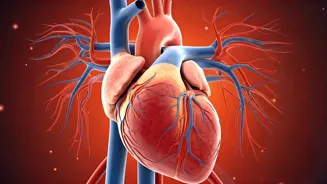Beyond Usual Suspects
Heart health discussions often center on familiar culprits like high blood pressure and blocked arteries. However, the realm of cardiovascular health encompasses
much more than these conventional risk factors. Emerging research indicates that several less obvious elements play a significant role in heart failure. These include aspects of your lifestyle, diet, and even subtle signals your body might be sending. It's time to broaden your understanding and look beyond the expected to safeguard your heart's well-being. Understanding these elements empowers individuals to take proactive steps towards maintaining a healthy heart and overall wellness. This expanded view can make a significant difference in prevention and early detection.
Unmasking Early Warnings
Contrary to common belief, chest pain is not always the first sign of a heart attack. There are often earlier, less dramatic symptoms that should prompt immediate attention. Subtle signals such as unusual fatigue, shortness of breath, and unexplained discomfort in the arms, neck, or jaw can be early indicators of underlying heart issues. It is important to pay close attention to the way the body feels. Women, in particular, may experience atypical symptoms, emphasizing the necessity of understanding individual body signals. Prompt recognition of these early warnings is crucial for timely medical intervention and can dramatically improve outcomes, potentially saving lives.
Food and Heart Health
What we eat has a profound impact on our cardiovascular well-being. Certain foods are particularly beneficial for promoting heart health and managing cholesterol levels. For example, incorporating a single clove of garlic into your daily routine could contribute to improved cholesterol management. Furthermore, the inclusion of certain fruits, such as pomegranates, in your diet can provide additional heart-protective benefits. Making informed dietary choices is a simple, yet powerful, strategy to support heart health. These choices can contribute to a significant improvement in overall cardiovascular function and health.
Listen to Your Body
The body is constantly sending signals, and learning to interpret them is essential for maintaining good health. This is particularly true when it comes to heart health. Fatigue that seems unwarranted, or any new, unexplained physical discomfort, should not be ignored. These can be the body's way of communicating that something isn't quite right. Regular self-assessment, coupled with open communication with healthcare professionals, is crucial. It is important to know your body. Being proactive, rather than reactive, is key to catching potential issues early, providing better chances for successful treatment and overall well-being. Recognizing and responding to the body's cues is a cornerstone of proactive heart care.
Metabolic Dysfunction Link
Emerging research is highlighting the connection between metabolic dysfunction, such as fatty liver disease, and cardiovascular health. The liver plays a vital role in metabolism. When it is not functioning optimally, it can adversely impact the heart. This link emphasizes the need for a holistic approach to health. Addressing issues such as fatty liver through dietary and lifestyle changes can contribute to a reduction in the risk of heart disease. Understanding the interplay between metabolic health and cardiovascular function allows for targeted interventions that promote overall wellness and longevity. This perspective underscores the body's integrated nature.













